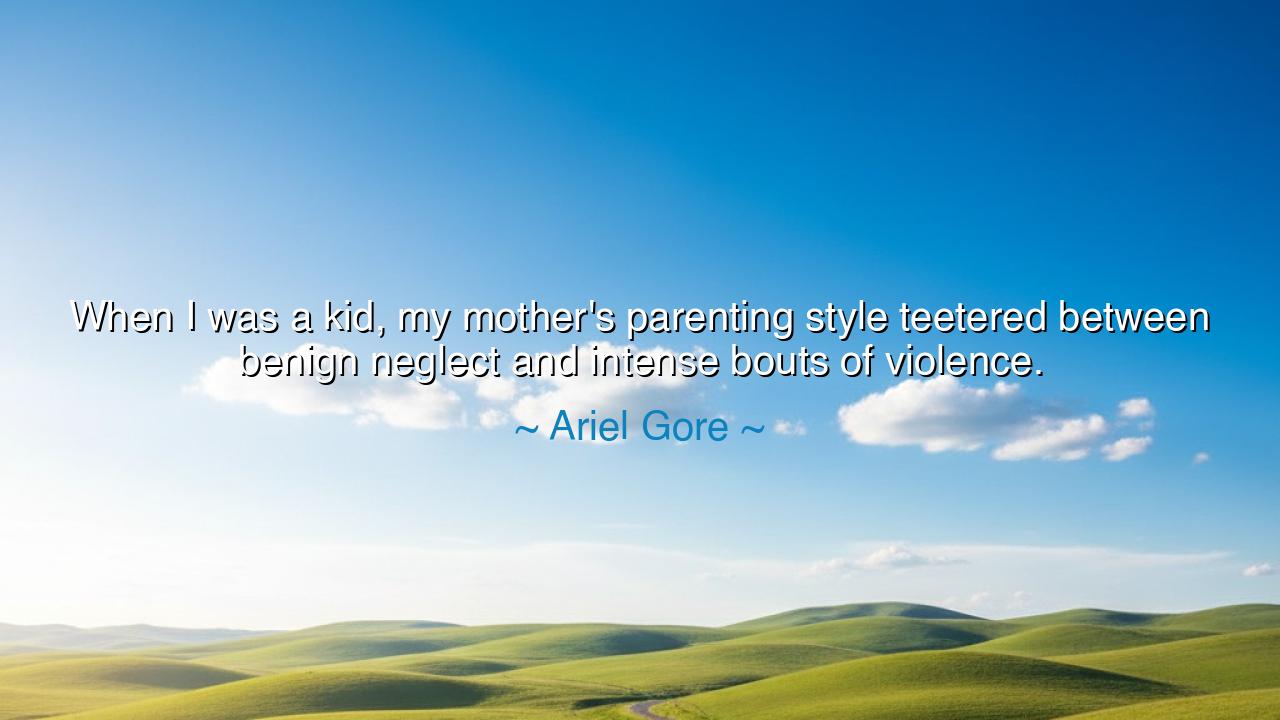
When I was a kid, my mother's parenting style teetered between
When I was a kid, my mother's parenting style teetered between benign neglect and intense bouts of violence.






Hear the voice of Ariel Gore, who does not hide the shadows of her youth: “When I was a kid, my mother’s parenting style teetered between benign neglect and intense bouts of violence.” These words are not spoken lightly, but as a testament to the scars left by love distorted. They reveal the truth that childhood, which should be the soil of nurture and stability, can instead become a place of fear and uncertainty when parenting swings wildly between absence and cruelty. In this confession is the echo of countless children, who grow not in safety but in turmoil, learning to endure what should never have been endured.
The origin of Gore’s reflection is rooted in the universal truth that extremes destroy balance. Neglect may seem gentle, for it does not strike with hand or word, yet it wounds by leaving a child unseen, unfed in spirit, left to wander without guidance. Violence, on the other hand, marks not only the body but the soul, teaching fear where there should be trust, planting confusion where there should be clarity. To oscillate between the two, as Gore’s mother did, is to raise a child in a storm, where no ground is steady and no love can be trusted.
History too records such tragedies. Consider the life of the Roman emperor Nero. His mother, Agrippina, veered between suffocating control and terrifying wrath. She alternated between doting indulgence and violent manipulation, raising her son in fear and instability. The result was a ruler infamous for cruelty, whose reign brought ruin to himself and his empire. His story stands as a grim reminder of Gore’s truth: when parenting swings between neglect and violence, it plants chaos in the soul of a child, which may later erupt into destruction.
Yet even in such darkness, Gore’s words carry a kind of clarity. By naming the extremes of her mother’s ways, she allows us to see them for what they are—not parenting, but distortion. True parenting is neither neglect nor violence, but presence: steady love, guidance, discipline tempered by care. To name the false is the first step toward building the true. And by speaking aloud what many suffer silently, Gore gives voice to others who endured the same contradictions, breaking the silence that allows such wounds to be passed on from generation to generation.
The lesson is clear: children need stability more than perfection. They need to know that love will not vanish into neglect, nor turn suddenly into harm. A parent who errs but remains consistent, who disciplines with fairness and loves with constancy, provides more security than one who swings between absence and rage. Parents must understand that their actions are the soil in which a child’s sense of self grows—if the soil is poisoned, the roots suffer; if it is tended, the tree will flourish.
Therefore, let all who hear these words take action: reject the extremes of neglect and violence. Be present in the lives of your children, even in small ways, for presence itself is healing. Discipline without cruelty, correct without humiliating, and above all, provide constancy. For a child raised in steadiness learns trust, and from trust grows strength. A child raised in chaos learns only fear, and from fear grows bitterness.
Thus Ariel Gore’s words, though born of pain, become a lantern of wisdom. Parenting is not the absence of care, nor the eruption of violence—it is the steady flame that warms, guides, and protects. And when we honor this truth, we break the cycle of extremes and raise a generation rooted not in fear, but in love that endures.






AAdministratorAdministrator
Welcome, honored guests. Please leave a comment, we will respond soon